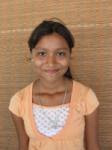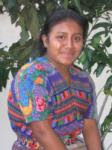Below is a reprint of an email I received the other day from Nancy Casey. She lives here in Moscow and goes to La Gonave, Haiti every year taking seeds and garden tools as well as donations she has raised through the year. Following the email is the text of a document that was attached to the email which I could not upload with it's pictures and attached video. If you'd like me to email it to you just leave a comment and let me know. By the way, the Janice Boughton who went along on this trip is my doctor.Hello everyone...I write this from the Haitian countryside where it is
raining. It rained yesterday, too. The rain brings relief from the
chocking dust and raises an optimism in the whole peasant community. At
last it's time to plant. Maybe there will be enough food.
I'm connected to peasant groups concerned with agriculture, the
environment, women and children's rights and human development. Everyone
is reeling from the earthquake and stoically going forward. I've been
learning more about their work and dreams and helping them articulate
their ideas about the help they need in proposal form.. I look forward
to sharing more information with you when I return home to Moscow, Idaho
at the end of the month. Attached is a newsletter with a report on a
visit to these same communities by three women from Moscow, Idaho.
When I am not "working" I've been sitting on porches and courtyards with
my extended network of Haitian family and friends. I've been laughing
and dancing a lot. I have walked miles and miles up and down mountains. I am fit and happy.
If you would like to send a tax-deductible donation to help the groups I'm
working with, see
www.CourageWoman.org/donate.htmfor the full info. Or send a check to VP Foundation PO Box 9757 Moscow,
ID 83843
If you want to be on a committee in Moscow, ID actively supporting this
work, contact MareeMcHugh:
maree@samaree.net.
If you don't want to receive these updates, or if you are receiving two
copies, please let me know.
Thank you for all your support.
Nancy Casey
nancy@turbonet.com
NEWS FROM HAITI, LA GONAVE UPDATENews from LaGonave
By Nancy Casey
What a pleasure it was for me to bring three visitors from my home-town of Moscow, Idaho to LaGonave to share the experience that I have been having here for 8 years. I feel so much less alone in what I have learned on this little island floating in the bay just off Port-au-Prince. Larger than the destitution, larger than the heart-ripping earth-quake stories, larger than the mind's struggle to reconcile "have" with "have-not" is the realization that these people take such joy from your simple presence. You fill your suitcase with the things you think they will most need, only find when you get here that the
youness of you is the real gift you have to give. You don't even know how to give this, yet they receive it and it leaves you reeling.
Ryan Law
What to say about Haiti? Well what I want to say is that we all have perceptions, myself included. We tend to rely on peoples fears and judgment without thinking beyond that. There is so much more that is right about Haiti than wrong. They are people of a very generous and diligent nature. I found family in Bwanwa, the community where we stayed. I found parts of myself that have been buried. I would say "Thanks to the wonderful people of LaGonave for teaching me about humanity"
Janice Boughton
A country like Haiti has been poor for so long that receiving charity has become normal for many people. The only English greeting many children know is "give me a dollar" and many of them will say it without even knowing what it means. Nevertheless, the people whom I came into contact with on my trip were among the most hard working, creative and industrious I have ever been around. It is these characteristics that allow them to live fairly successfully on an island like LaGonave which has been raped of many of its natural resources decades ago and left for dead. This island now blooms with numerous kitchen gardens,farms, churches, schools and vibrant woman's rights groups. Rather than in the spirit of “helping,” we made our visit in the spirit of supporting them in the good work they already do. There are things that are wrong with Haiti, but there are more things that are right.
Louise-Marie Dandurand
When Louise-Marie Dandurand came back from her first walk with two agricultural agents her eyes flashed brighter blue than the sky as she said, "This is just amazing!" She toured family and community vegetable plots, gullies terraced for soil conservation, tree nurseries, and met some of the people responsible for encouraging others to do this work without adequate tools or nutrition. Upon returning home, Louise-Marie writes: I'm no longer shrink-wrapped to the couch. I have some thoughts to write up, in relation to gardens, soil conservation, and water water usage. I'd like to address some of the (plant) diseases I saw, as well as explore some ideas on seeds and plant breeding. I wish I could find more information about the endemic plants of Haiti. I also saw a lot of homes damaged by earthquake as I was walking around.
Nancy Casey
Now that the visitors are gone, I am back to "work". My calendar is packed for the next three weeks with visits to gardens and earthworks, sitting in on meetings of community groups and women's groups trying to make things better for themselves, looking at earthquake-damaged houses we helped rebuild after the quake, and helping the farmers' and women's groups turn their visions into clear proposals that I can find funding for. The needs are astounding. I wonder if I give the wrong impression when I write of my astonishment about how much Haitians do with so little. $4000 helped to repair/rebuild a half-dozen houses in two isolated communities, leaving about 200 more houses to go in those towns, and another hundred or so towns with no help.
The $90,000+ budget for Courageous Women is mostly for food to help destitute children and feed women who walk an hour or more to attend a meeting. Janice Boughton helped the group bring more focus on women’s health needs—good public health education, women who can’t afford to have breast cancer or TB treated despite the low cost, sexually transmitted diseases, preventing the incipient AIDS epidemic.
The "Farming is Life" group hopes for $6,000 to buy 20 sets of tools, each of which will be shared by 25 families. Another $3,000 will raise the salaries of the two young men leading this work to a living wage. They wish they could feed people who come to trainings, build and repair cisterns, save the islands indigenous flora and the knowledge of healing associated with it. They were so inspired by Louise-Marie Dandurand’s extensive knowledge and the possibilities she raised for finding university research contacts. Today, before going on an hour-long bone-jarring motorcycle ride to Plèzans, a community where we helped re-build 2 houses, I spent a couple hours working through an accounting and reporting process with the farming group that is simple enough not to detract from their work, but accurate enough to make their handling of money transparent. I don't want to discount the value of your donations in the least. Every dollar you send goes really far. Still, I hope with the information I'm bringing back from this trip--written by the Haitians themselves--we will be able to supplement your donations with grants from foundations that support this kind of work. I fear that the generosity of our personal pockets will not be sufficient for the needs.
VP Foundation: Encouraging balance in people's lives and communities
PO Box 9757
Moscow, Idaho 83843
Tel: (208)882-9698
Email: nancy@turbonet.com
How to Get Involved
I'm thrilled that Louise-Marie, Janice, and Ryan have shared the experience of the Haiti that I know. I would lead another trip this winter if somebody wants to come. Let me know. nancy@turbonet.com
We are still hoping to bring Abner Sauveur and Elijen Deravil to Moscow (Idaho) this summer to watch our gardening season unfold, learn English, and connect with collaborators. Abner has a 5-year visitor’s visa and can easily travel to the US. At present the US Consulate in Port-au-Prince is not accepting visa applications for Haitians, Elijen is ready to apply as soon as the door is open.
DONATION INFORMATION
You can support this work by making a tax deductible donation online at::
www.CourageWoman.org/donate.htm
Or you can send a donation by mail to:
VP Foundation Box 9757 Moscow, ID.
You can tag your donation for: food, farming, environment, women and children, health care, housing, exchange visit, or "as needed".
Thank you so much. Mesi davans.
 Her name is Paola Emma and she's from Guayaquil, Ecuador. Guayaquil is on the coast, a busy port city of 3.3 million. As you can imagine it gets very hot and humid there. She turned 12 last December. She's 4'6" and weighs 62 pounds. Her favorite school subjects are Science and Grammar. She speaks Spanish. In her spare time she likes to play with friends and ride her bike. She helps out at home with dish washing and general housework. Her father is a bricklayer and her mother is a homemaker. She has 2 older sisters, one younger sister and 1 younger brother. Her home has a wooden floor and a corrugated metal roof. It consists of 1 bedroom, a kitchen and a living room. The family sleeps on
Her name is Paola Emma and she's from Guayaquil, Ecuador. Guayaquil is on the coast, a busy port city of 3.3 million. As you can imagine it gets very hot and humid there. She turned 12 last December. She's 4'6" and weighs 62 pounds. Her favorite school subjects are Science and Grammar. She speaks Spanish. In her spare time she likes to play with friends and ride her bike. She helps out at home with dish washing and general housework. Her father is a bricklayer and her mother is a homemaker. She has 2 older sisters, one younger sister and 1 younger brother. Her home has a wooden floor and a corrugated metal roof. It consists of 1 bedroom, a kitchen and a living room. The family sleeps on 












